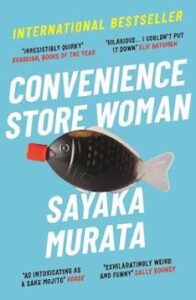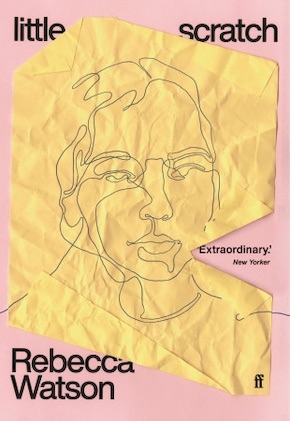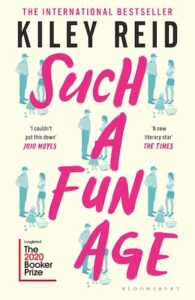Fiction at work
by Rebecca Watson‘Workplace’ is a vague, literal term. It’s too broad to conjure an image, though it might summon a feeling. (For some: not here again, for others: here we go!). Nowadays my workplace is also my dinner table, the place where I wrapped Christmas presents I’m yet to give. But old, paused office life was fertile, if infrequent, ground for fiction.
I set my debut novel little scratch during the working day partly because I wanted my protagonist to be occupied: to have systems she had to follow and force herself through. I needed something that kept her moving but that she was also resistant to. Working life, when tracked minute by minute, can feel like Groundhog Day. For my protagonist, going through a psychological reckoning, the day needed to feel like any day, like the drama of her neurosis, her inability to speak up, might have been the same the day before, could be the same the day after.
The workplace can be a rich setting for the novel, but it is also often a subject we ignore. The writer can skip it: concentrating only on the transcendental, the rare, the climactic. But in the everyday is a special kind of value: a scrutiny of human experience that is always close to us. It is a setting we are so familiar with that it is easy to stop seeing it entirely: like a phone background. Work is rich for writing because it is hierarchical, political, existential: and, of course, it is a performance. We are our formal selves, cast into power roles. These are some of the books that succeed in taking it on.
 This is Pleasure by Mary Gaitskill
This is Pleasure by Mary Gaitskill
Mary Gaitskill takes a certainty, and shreds it. She zooms in on what appears as a straight line until suddenly it looks curved. In This is Pleasure, Gaitskill revolves between Margot, a middle-aged book editor, and her friend and ex-colleague Quin, to look at the nuances of office relationships – how they have shifted, and the impossibility of drawing lines when human interpretation is (sometimes wilfully) so varied.
Convenience Store Woman by Sayaka Murata
The systems of work can be comforting purely in giving the day purpose. Go to this location, stay here for this number of hours, follow these tasks. Sayaka Murata (in her international bestseller, translated from the Japanese by Ginny Tapley Takemori) follows Keiko, a supermarket worker who would like to continue being one forever if people would only let her. It’s a good book: short enough for the conceit to unnerve rather than grate. It’s strange, funny, detached, and skewers our obsession with finding meaning in career ascension and relationships.
Amis is great on the way we can misjudge our own ambitions and completely misread everything in the speeding obsession with success.”
A heart attack of a novel. Read this with your arms straight out in front of you so you don’t get knocked out by the stench of booze and anxiety. Amis is great on the way we can misjudge our own ambitions and completely misread everything in the speeding obsession with success. Work (and, you guessed it, money) is the destructive heart of the book: the way we can overcommit and forget or misjudge ourselves in the rush.
 A Jest of God by Margaret Laurence
A Jest of God by Margaret Laurence
This quiet but deep-reaching book was first published in 1966 and resurrected by Head of Zeus’ Apollo classic series. Rachel, a 34-year-old school mistress, lives a quiet life, moving between paid and unpaid care: working as a school mistress and looking after her insistent and invalid mother. Laurence is devastating in narrating a life that feels stuck in duty: surrounded but alone. That is, of course, (cue ellipsis), until she falls in love…
Look, I know the Amis family is not exactly in vogue, at least on Twitter, but they’re both making it onto this list. Lucky Jim licks up all the comic potential of working for the sake of working. Jim has stumbled into a job as a history lecturer and continues to stumble after taking it up, eternally hungover and with no clue what he is doing. Amis is brilliant on the physicality of cluelessness.
Work is a satisfying way of holding power exchanges up to the light. Kiley Reid studies interplays of power and race; how they can feed or complicate the other, and the way we subscribe to narratives about the right kind of job, career and life path. Such a Fun Age essentially says: fuck that.
Show Them a Good Time by Nicole Flattery
The title story of this book centres on workers in a petrol station. A new hire is told to stand by the till and pretend. (The petrol station in question is a practice scheme: not to be operated, but to appear to its utmost as if it is.) Flattery takes familiar office dynamics and makes them absurd. Nothing makes sense and yet everything is exactly right.
Mantel teases out the overlap between psychic and writerly intuition in this overpowering book, and is brilliant on powerlessness.”
Beyond Black follows a working world I’m not too familiar with: that of the touring medium. Alison struggles to separate work and life, her assistant Colette moving in with her, her head plagued with ghosts that never leave. Mantel teases out the overlap between psychic and writerly intuition in this overpowering book, and is brilliant on powerlessness: clients listen to Alison while simultaneously holding the authority. Once she has been of use, they fling her aside.
 Mary Barton: A Tale of Manchester Life by Elizabeth Gaskell
Mary Barton: A Tale of Manchester Life by Elizabeth Gaskell
“I had always felt a deep sympathy,” Gaskell writes in the preface to Mary Barton, “with the care-worn men who looked as if doomed to struggle through their lives in strange alternations between work and want; tossed to and fro by circumstances, apparently in even a greater degree than other me.” Gaskell’s debut, which was published anonymously at the time (1848), centres on millworkers in 1840s Manchester. It’s tragic, miserable, and worth reading.
There’s No Such Thing as an Easy Job by Kikuko Tsumura
Kikuko Tsmura’s novel, translated by Polly Barton, has a detached, context-less voice. We know little of the protagonist’s life; only that she is searching for a job that will not make her overthink, overcommit or overwork. She goes from temp job to temp job: from watching surveillance footage to sitting in a hut of a vast park. What groups the jobs is that they are never quite the right choice. Tsumura hones in on how life interrupts: colleagues intrude, the brain overthinks. Work will always be work.
 Rebecca Watson is Assistant Arts Editor at the Financial Times and lives in London. Her work has been published in the Times Literary Supplement and Granta. In 2018, she was shortlisted for the White Review Short Story Prize. little scratch is published by Faber & Faber.
Rebecca Watson is Assistant Arts Editor at the Financial Times and lives in London. Her work has been published in the Times Literary Supplement and Granta. In 2018, she was shortlisted for the White Review Short Story Prize. little scratch is published by Faber & Faber.
Read more
rebeccawatson.co.uk
rebeccawhatsun
@rebeccawhatsun
Author portrait © Sophie Davidson


 Such a Fun Age by Kiley Reid
Such a Fun Age by Kiley Reid